外研版(2019)必修第二册:Unit2 Let's celebrate Using language课件(18张)
文档属性
| 名称 | 外研版(2019)必修第二册:Unit2 Let's celebrate Using language课件(18张) |
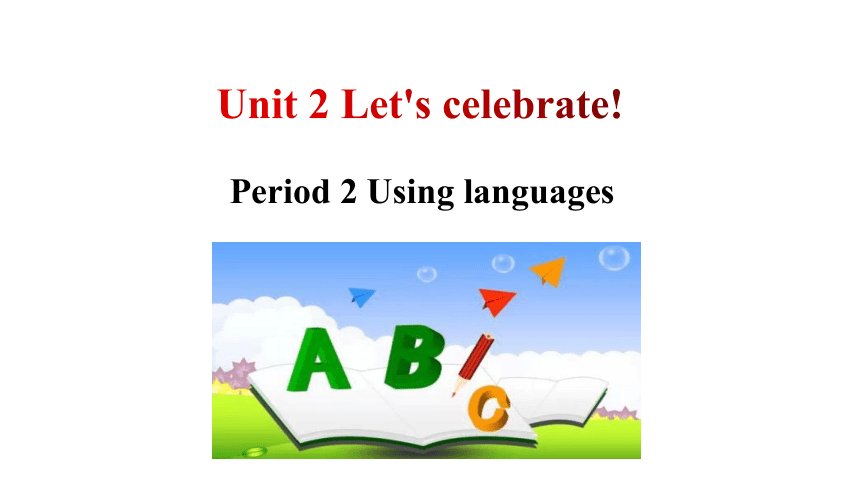
|
|
| 格式 | pptx | ||
| 文件大小 | 862.3KB | ||
| 资源类型 | 教案 | ||
| 版本资源 | 外研版(2019) | ||
| 科目 | 英语 | ||
| 更新时间 | 2022-02-28 08:59:02 | ||
图片预览

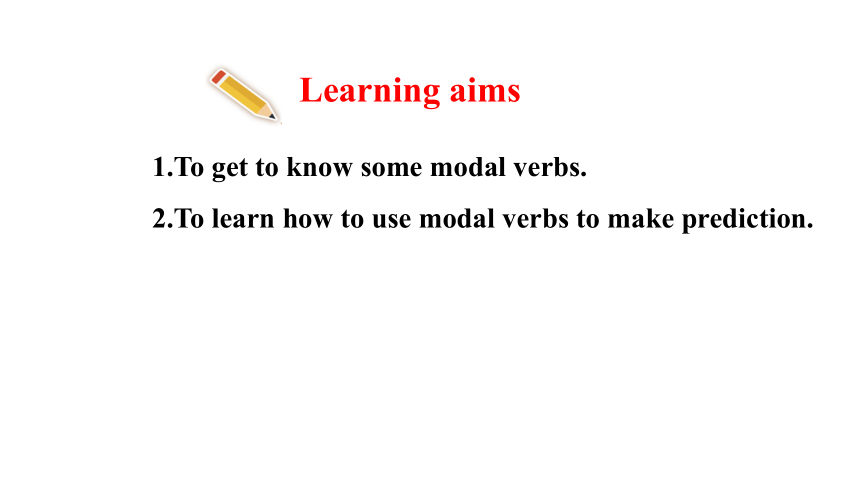
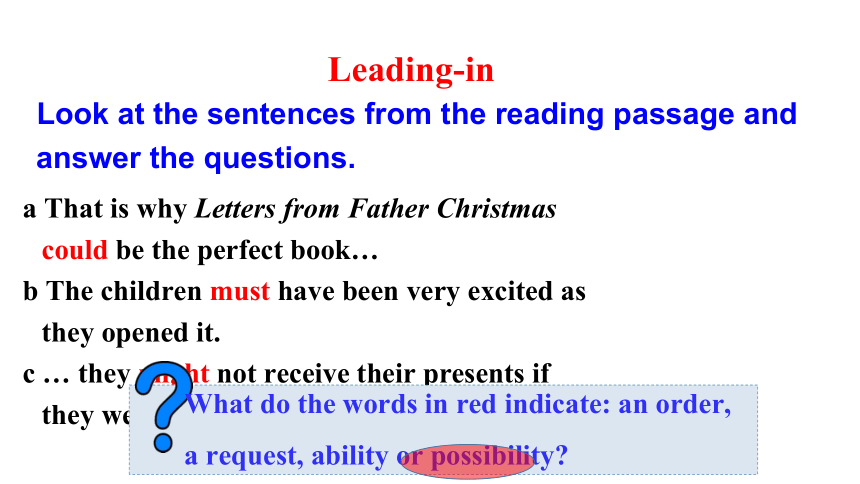
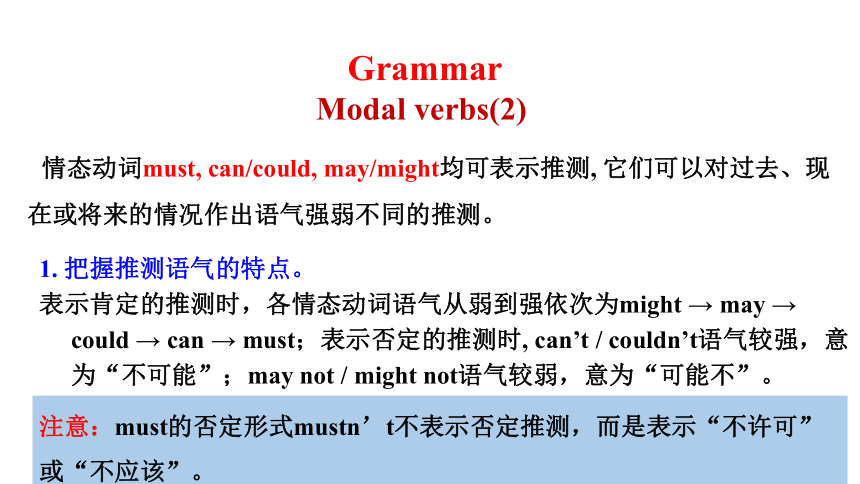
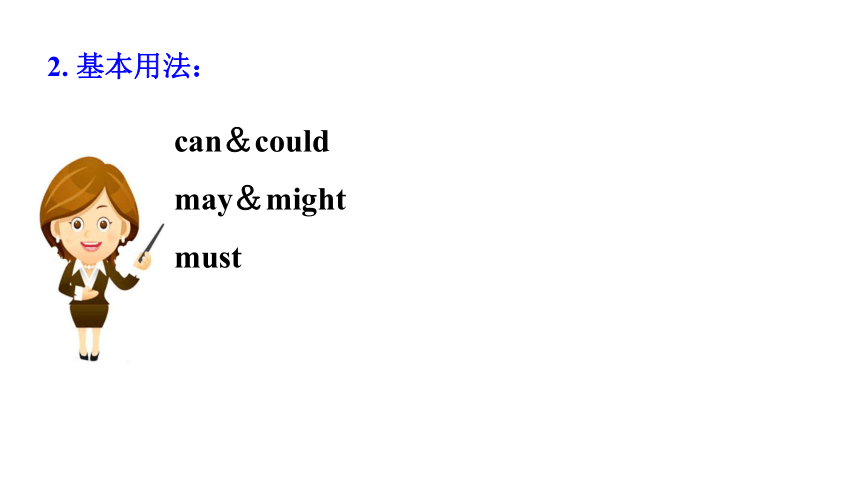
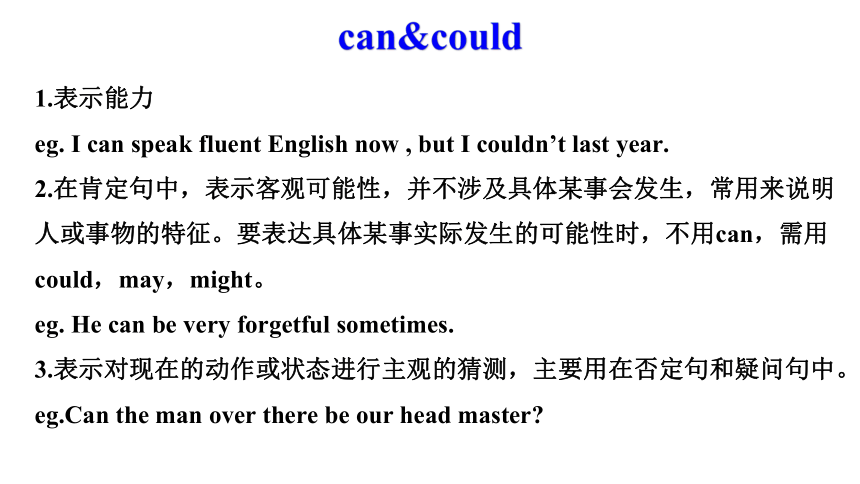
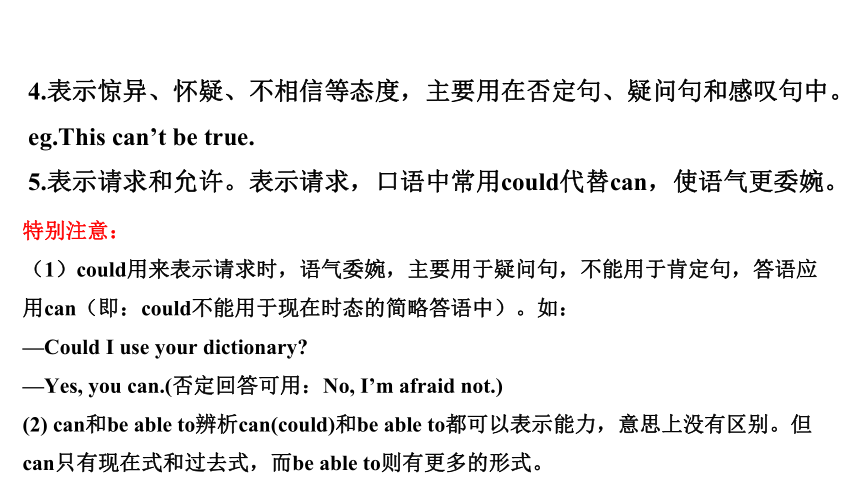
文档简介
(共18张PPT)
Period 2 Using languages
Unit 2 Let's celebrate!
1.To get to know some modal verbs.
2.To learn how to use modal verbs to make prediction.
Learning aims
Look at the sentences from the reading passage and answer the questions.
a That is why Letters from Father Christmas could be the perfect book…
b The children must have been very excited as they opened it.
c … they might not receive their presents if they were not good.
Leading-in
What do the words in red indicate: an order, a request, ability or possibility
情态动词must, can/could, may/might均可表示推测, 它们可以对过去、现在或将来的情况作出语气强弱不同的推测。
1. 把握推测语气的特点。
表示肯定的推测时,各情态动词语气从弱到强依次为might → may → could → can → must;表示否定的推测时, can’t / couldn’t语气较强,意为“不可能”;may not / might not语气较弱,意为“可能不”。
Grammar
Modal verbs(2)
注意:must的否定形式mustn’t不表示否定推测,而是表示“不许可”或“不应该”。
2. 基本用法:
can&could
may&might
must
1.表示能力
eg. I can speak fluent English now , but I couldn’t last year.
2.在肯定句中,表示客观可能性,并不涉及具体某事会发生,常用来说明人或事物的特征。要表达具体某事实际发生的可能性时,不用can,需用could,may,might。
eg. He can be very forgetful sometimes.
3.表示对现在的动作或状态进行主观的猜测,主要用在否定句和疑问句中。
eg.Can the man over there be our head master
can&could
4.表示惊异、怀疑、不相信等态度,主要用在否定句、疑问句和感叹句中。
eg.This can’t be true.
5.表示请求和允许。表示请求,口语中常用could代替can,使语气更委婉。
特别注意:
(1)could用来表示请求时,语气委婉,主要用于疑问句,不能用于肯定句,答语应用can(即:could不能用于现在时态的简略答语中)。如:
—Could I use your dictionary
—Yes, you can.(否定回答可用:No, I’m afraid not.)
(2) can和be able to辨析can(could)和be able to都可以表示能力,意思上没有区别。但can只有现在式和过去式,而be able to则有更多的形式。
【即学即练】
1. It was so noisy that we________hear ourselves speak.
2. —I_______thank you enough for what you have done for me.
—You’re welcome.
3. 他有可能是我们的老师吗?
______________________
can't
can't
Can he be our teacher
1.表示请求和许可,在疑问句中,might可以代替may,它表示的语气更加委婉。
----May I have a few words with your manager
----Yes, you may.
知识归纳:
may not表示“不可;不许”时,语气较强,有命令强制的意味,常可用mustn't代替,用来回答问句“May I... ”
may&might
2. 表示推测
might和may表示对现在、将来的推测,多用于肯定句中或否定句中。
对过去的推测要用may/might have done.
might比may的可能性更小。
3. may可以用于祈使句中,表示祝愿,其结构为:May+主语+动词原形“。
May you succeed!祝你成功!
【即学即练】
might
may
1. Helen ______ go on the trip with us, but she isn’t quite sure yet.
2. —I left my handbag on the train, but luckily someone gave it to a
railway official.
—How unbelievable it is to get it back! I mean, someone_________have
stolen it.
1.表示“必须,应该”之意,语气比should,ought to强烈。其否定形式mustn’t表示“不准,不应该,禁止”等意。
eg.Everybody must obey the law.
2.在回答带有must的问句时,否定回答常用needn’t或don’t have to,表示“不必”,而不用mustn’t。
eg.—Must I come back before ten
—Yes,you must.(No, you needn’t.)
3.表示有把握的推测,意为“一定、准是、想必”,只用于肯定句中。
eg.It must be my mother.
must
【即学即练】
must
must
1. You _______ be tired after the long trip, aren’t you
2. You________be Carol. You haven’t changed a bit after all
these years.
3. It ________________________, for the ground is wet this
morning.
昨天晚上一定是下雨了,因为今早地面是湿的。
must have rained last night
Summary
情态动词(2)
基本用法:
can&could
may&might
must
语气特征
1. Rewrite the underlined sentences in the conversation using can/could, may/might and must.
Exercise
(At a fancy dress party)
Chris: I spent ages putting up all the
balloons and flowers last night.
Jean: I expect you are feeling tired now!
Chris: Yes, I am. Look that guy is dressed as Batman. Is that Mike
Jean: It’s possibly him. Check out that girl
over there. I’m sure that’s Lucy.
Chris: No, I don’t think that’s Lucy. Lucy isn’t that tall.
Jean: Look at those two guys dressed as chickens!
Oh, they’re waving at us!
Maybe they’re from our school.
Chris: Let’s go and find out.
You must feel tired now!
It may/might/could be him.
That must be Lucy!
that can’t be Lucy!
They may/might/could be from our school.
(1) If you _______ smoke, please go outside.
A. can B. should C. must D. may
(2)—I don’t really like James. Why did you invite him
— Don’t worry. He __________ come. He said he wasn’t certain what his plans were.
A. must not B. need not C. would not D. might not
2. Choose the best answers.
(3)The traffic is heavy these days. I arrive a bit late, so could you save me a place
A. can B. must C. need D. might
(4)One of the few things you ___ say about English people with certainty is that they talk a lot about the weather.
A. need B. must C. should D. can
Period 2 Using languages
Unit 2 Let's celebrate!
1.To get to know some modal verbs.
2.To learn how to use modal verbs to make prediction.
Learning aims
Look at the sentences from the reading passage and answer the questions.
a That is why Letters from Father Christmas could be the perfect book…
b The children must have been very excited as they opened it.
c … they might not receive their presents if they were not good.
Leading-in
What do the words in red indicate: an order, a request, ability or possibility
情态动词must, can/could, may/might均可表示推测, 它们可以对过去、现在或将来的情况作出语气强弱不同的推测。
1. 把握推测语气的特点。
表示肯定的推测时,各情态动词语气从弱到强依次为might → may → could → can → must;表示否定的推测时, can’t / couldn’t语气较强,意为“不可能”;may not / might not语气较弱,意为“可能不”。
Grammar
Modal verbs(2)
注意:must的否定形式mustn’t不表示否定推测,而是表示“不许可”或“不应该”。
2. 基本用法:
can&could
may&might
must
1.表示能力
eg. I can speak fluent English now , but I couldn’t last year.
2.在肯定句中,表示客观可能性,并不涉及具体某事会发生,常用来说明人或事物的特征。要表达具体某事实际发生的可能性时,不用can,需用could,may,might。
eg. He can be very forgetful sometimes.
3.表示对现在的动作或状态进行主观的猜测,主要用在否定句和疑问句中。
eg.Can the man over there be our head master
can&could
4.表示惊异、怀疑、不相信等态度,主要用在否定句、疑问句和感叹句中。
eg.This can’t be true.
5.表示请求和允许。表示请求,口语中常用could代替can,使语气更委婉。
特别注意:
(1)could用来表示请求时,语气委婉,主要用于疑问句,不能用于肯定句,答语应用can(即:could不能用于现在时态的简略答语中)。如:
—Could I use your dictionary
—Yes, you can.(否定回答可用:No, I’m afraid not.)
(2) can和be able to辨析can(could)和be able to都可以表示能力,意思上没有区别。但can只有现在式和过去式,而be able to则有更多的形式。
【即学即练】
1. It was so noisy that we________hear ourselves speak.
2. —I_______thank you enough for what you have done for me.
—You’re welcome.
3. 他有可能是我们的老师吗?
______________________
can't
can't
Can he be our teacher
1.表示请求和许可,在疑问句中,might可以代替may,它表示的语气更加委婉。
----May I have a few words with your manager
----Yes, you may.
知识归纳:
may not表示“不可;不许”时,语气较强,有命令强制的意味,常可用mustn't代替,用来回答问句“May I... ”
may&might
2. 表示推测
might和may表示对现在、将来的推测,多用于肯定句中或否定句中。
对过去的推测要用may/might have done.
might比may的可能性更小。
3. may可以用于祈使句中,表示祝愿,其结构为:May+主语+动词原形“。
May you succeed!祝你成功!
【即学即练】
might
may
1. Helen ______ go on the trip with us, but she isn’t quite sure yet.
2. —I left my handbag on the train, but luckily someone gave it to a
railway official.
—How unbelievable it is to get it back! I mean, someone_________have
stolen it.
1.表示“必须,应该”之意,语气比should,ought to强烈。其否定形式mustn’t表示“不准,不应该,禁止”等意。
eg.Everybody must obey the law.
2.在回答带有must的问句时,否定回答常用needn’t或don’t have to,表示“不必”,而不用mustn’t。
eg.—Must I come back before ten
—Yes,you must.(No, you needn’t.)
3.表示有把握的推测,意为“一定、准是、想必”,只用于肯定句中。
eg.It must be my mother.
must
【即学即练】
must
must
1. You _______ be tired after the long trip, aren’t you
2. You________be Carol. You haven’t changed a bit after all
these years.
3. It ________________________, for the ground is wet this
morning.
昨天晚上一定是下雨了,因为今早地面是湿的。
must have rained last night
Summary
情态动词(2)
基本用法:
can&could
may&might
must
语气特征
1. Rewrite the underlined sentences in the conversation using can/could, may/might and must.
Exercise
(At a fancy dress party)
Chris: I spent ages putting up all the
balloons and flowers last night.
Jean: I expect you are feeling tired now!
Chris: Yes, I am. Look that guy is dressed as Batman. Is that Mike
Jean: It’s possibly him. Check out that girl
over there. I’m sure that’s Lucy.
Chris: No, I don’t think that’s Lucy. Lucy isn’t that tall.
Jean: Look at those two guys dressed as chickens!
Oh, they’re waving at us!
Maybe they’re from our school.
Chris: Let’s go and find out.
You must feel tired now!
It may/might/could be him.
That must be Lucy!
that can’t be Lucy!
They may/might/could be from our school.
(1) If you _______ smoke, please go outside.
A. can B. should C. must D. may
(2)—I don’t really like James. Why did you invite him
— Don’t worry. He __________ come. He said he wasn’t certain what his plans were.
A. must not B. need not C. would not D. might not
2. Choose the best answers.
(3)The traffic is heavy these days. I arrive a bit late, so could you save me a place
A. can B. must C. need D. might
(4)One of the few things you ___ say about English people with certainty is that they talk a lot about the weather.
A. need B. must C. should D. can
